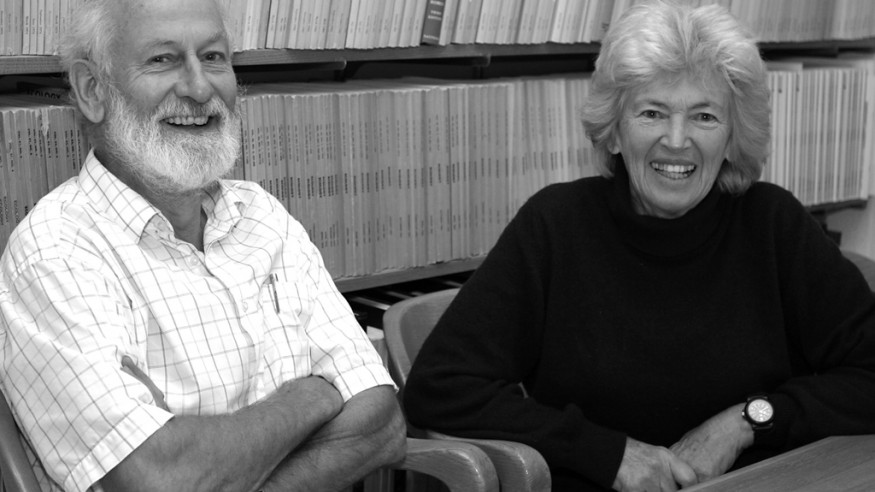
Evolutionary Biologists to Speak April 18 at Ohio Wesleyan
Peter and Rosemary Grant
DELAWARE, OHIO – Internationally recognized Princeton University biologists Peter and Rosemary Grant will be honored by Ohio Wesleyan University on April 18 when they discuss “How and Why Species Multiply: Evolution of Darwin’s Finches” and receive honorary OWU Doctor of Science degrees.
The husband-and-wife researchers will be recognized at 7:30 p.m. in Gray Chapel inside Ohio Wesleyan’s University Hall, 61 S. Sandusky St. They will speak immediately after receiving their honorary degrees. The event is free and open to the public.
In 2009, the couple won the Inamori Foundation’s prestigious Kyoto Prize for their research. The prize recognizes lifetime achievement in the areas of basic science, advanced technology, and arts and philosophy. In awarding the prize to the couple, the foundation stated: “The Grants’ empirical research has made the most important contribution sinceDarwintoward making evolutionary biology a science in which proof is possible.”
The Grants outlined their work and its goals in their 2008 book, “How and Why Species Multiply: The Radiation of Darwin’s Finches.”
“We choose a single group of related species for close scrutiny,” they wrote, “and attempt to answer the following questions: Where did they come from, how did they diversify, what caused them to diversify as much as they did (and no more) and over what period of time did this happen?”
The Grants also were featured in Jonathan Weiner’s 1994 Pulitzer Prize-winning book, “The Beak of the Finch,” which chronicled their annual six-month stays on the Galápagos Islands to conduct their research. Through their work, the Grants each seek unique information to support their specific interests.
Peter Grant, Ph.D., states: “I am interested in ecology, evolution and behavior. I seek an understanding of the origin of new species, their ecological interactions, their persistence in different communities and their ultimate extinction.”
Rosemary Grant, Ph.D., explains: “I am interested in the diversity of individuals produced by the interaction between genetics, ecology and behavior. How natural selection acts on this variation; the evolutionary response to natural selection and the bearing this has on the process of speciation.”
Both Grants have retired from the Princeton faculty, but remain active researchers. Peter Grant earned his doctorate from the University of British Columbia, Canada, and Rosemary Grant earned hers from Uppsala University, Sweden. Learn more about their research at http://www.princeton.edu/main/news/archive/S24/53/41M02/index.xml?section=topstories.
Sponsored by the OWU Department of Zoology, the Grants’ presentation is part of the Clark Ornithology Lecture Series, endowed by the Lucien Clark family.
Ohio Wesleyan University is one of the nation’s premier small, private universities, with more than 90 undergraduate majors, sequences, and courses of study, and 23 NCAA Division III varsity sports. Located in Delaware, Ohio, just minutes north of Ohio’s capital and largest city, Columbus, the university combines a globally focused curriculum with off-campus learning and leadership opportunities that translate classroom theory into real-world practice. OWU’s close-knit community of 1,850 students represents 47 states and 57 countries. Ohio Wesleyan was named to the 2012 President’s Higher Education Community Service Honor Roll with distinction, is featured in the book “Colleges That Change Lives,” and is included on the “best colleges” lists of U.S. News & World Report and The Princeton Review. Learn more at www.owu.edu.
